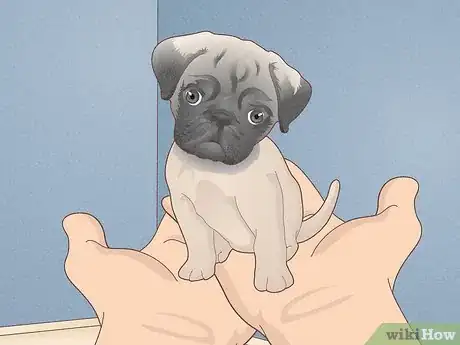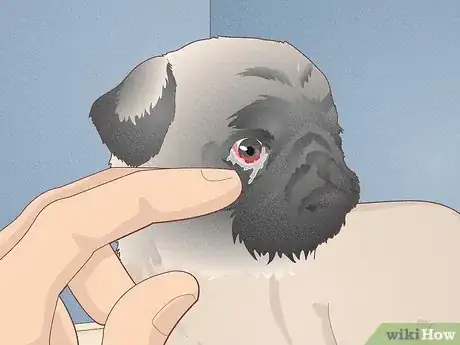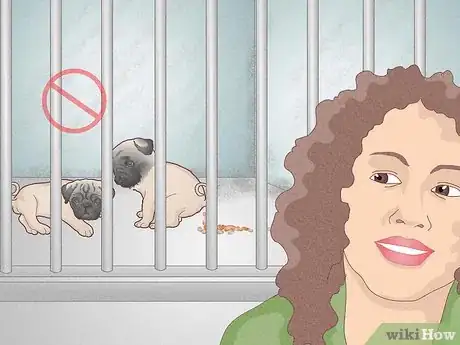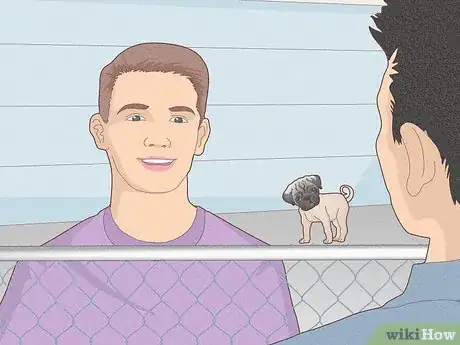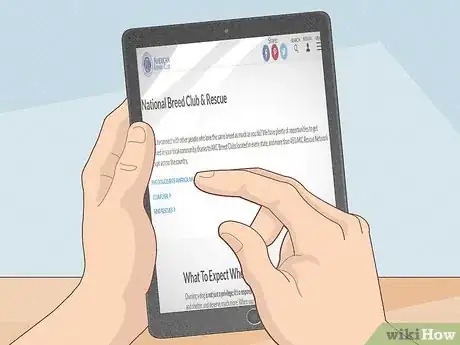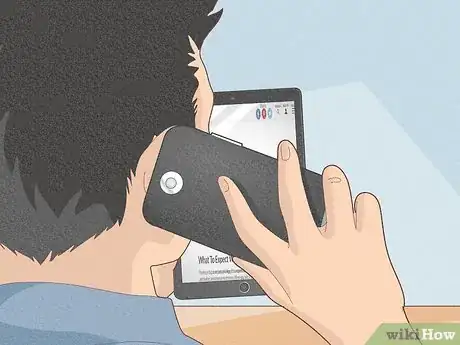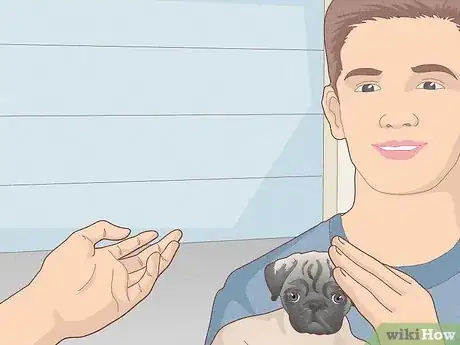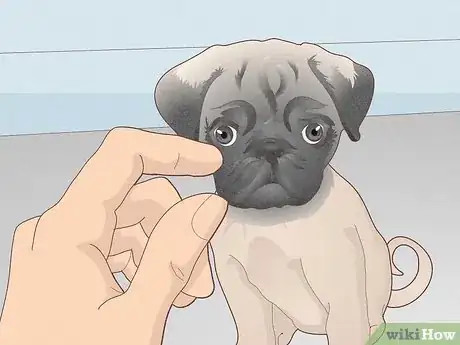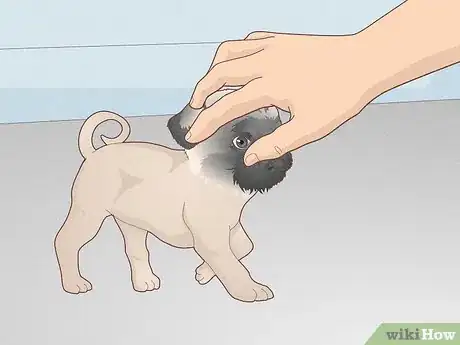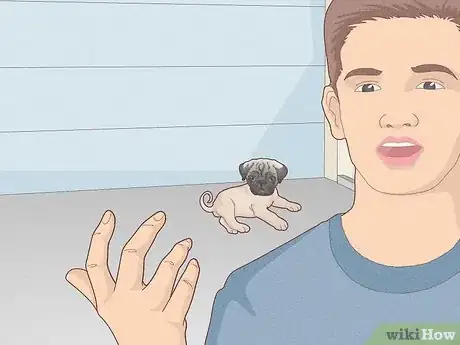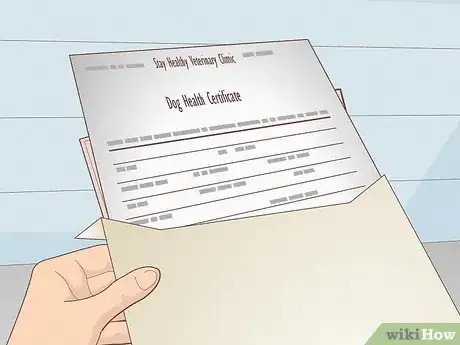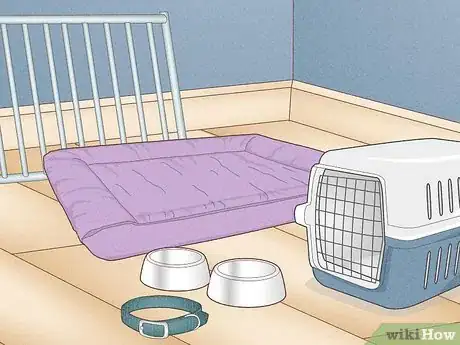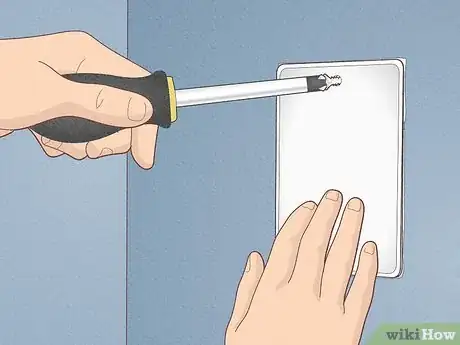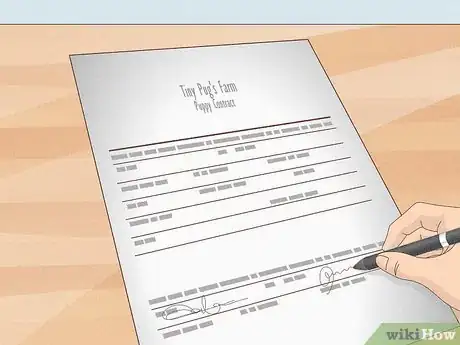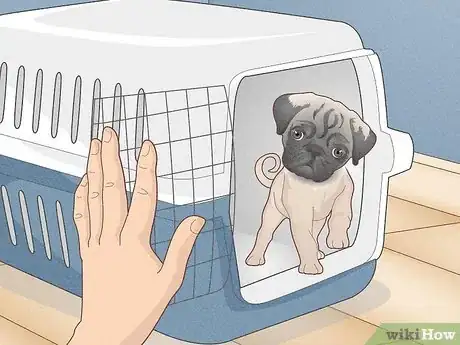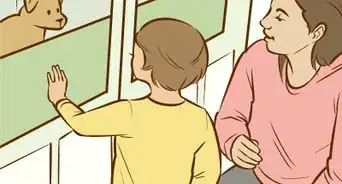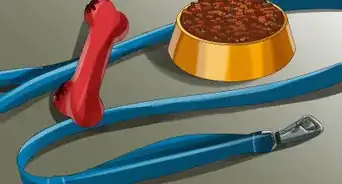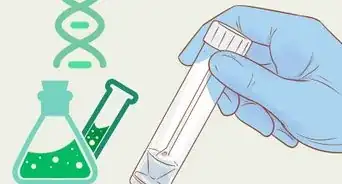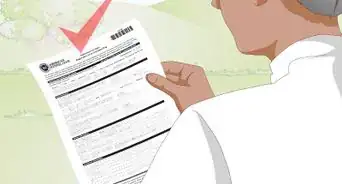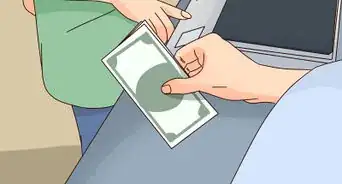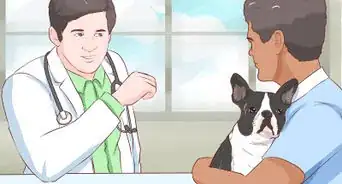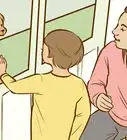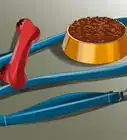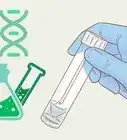This article was co-authored by Shawn Riley. Shawn Riley is a Canine Trainer & Behaviorist based in Tualatin, Oregon. With over 40 years of experience, Shawn trains people to properly establish and maintain leadership roles with their canine companions. Shawn has trained with several acclaimed canine experts and refined The Dog Way training methods through experience and observation of dogs' natural interactions within their groups. Shawn has appeared on several local TV shows and was recruited by National Geographic as the on-set Behavioral Advisor for a national video series called “My Dog Ate What?”
This article has been viewed 84,941 times.
Deciding you want to purchase a pug puppy is exciting. However, you want to make sure you find the right puppy for you. Make sure you seek out reputable breeders so your puppy does not come with any health problems. Visit the puppies in person and choose the one that suits your needs. Ask the breeder plenty of questions about the puppy's current health and pedigree. Before bringing your new friend home, make sure your house is puppy proofed.
Steps
Beginning the Process
-
1Make sure a pug puppy is right for you. Pug puppies come with a unique set of needs. Puppies in general require more care than an adult dog. Before embarking on your journey to find a pug puppy, consider whether you can accommodate one at the moment.
- Make sure you have time for a puppy. Puppies need extra feeding, as well socialization and training. If you have a very busy schedule, you may want to wait for things to settle down before getting a puppy.
- Pugs, as a pet, require some maintenance. The folds in their faces need regular cleaning, and they're also prone to a great deal of shedding. Make sure you can live with frequent grooming, and accept the fact your house will never quite be hair-free.
-
2Familiarize yourself with potential future health problems. Like all breeds, pugs are prone to certain health problems. While a good breeder is adept at breeding out such problems, there are certain problems that are hard to breed out. These are usually simply due to how a pug is built. Learn the risks associated with pugs and make sure you're prepared to deal with them down the road.
- All pugs, regardless of breeding, are prone to eye problems. Pug's distinctive, bulging eyes expose a large area of their corneas, which puts their eyes at risk of drying out or forming ulcers. You may have to deal with frequent vet visits to deal with eye issues.
- Pugs are very prone to overheating because their flattened faces makes it hard for them to breathe. This problem can be even worse in hot weather, and overheating can cause serious health issues for a pug.
- Behaviorally, pugs are a more social breed. They are more prone to separation anxiety issues than other breeds. If you're gone a lot, a pug may not be the right dog for you.
Advertisement -
3Avoid bad breeders and puppy mills. When searching for a breeder, there are a few places to scratch off your list right away. Puppy mills and very obviously bad breeders should be avoided. You're more likely to get a pug with existing health problems, or the risk of developing health problems down the road.
- In general, do not trust a breeder who simply sells dogs online from any given buyer. A breeder who does not ask any questions is probably not a good breeder. Responsible breeders want to make sure their dogs go to good homes.
- Puppy mills sometimes sell puppies to pet stores, so avoid buying a pug from a pet store. Puppy mills may also sell pugs online. If you can simply look at a picture of a puppy and purchase it, this is probably a puppy mill.
-
4Seek out and contact local breeders. Start your search locally. If you're lucky, you will be able to find a breeder who lives nearby. Look for ads in the newspaper, online, at local pet stores and veterinary clinics, and at any local pet clubs. A breeder in your area is convenient, as you will not have to travel far to see the puppies.
- Just because someone is a local breeder, do not assume they are an ethical one. Make sure to visit any breeder in person and look at the puppies physically before purchasing one.
-
5Locate reputable breeders online. Unfortunately, not all areas have pug breeders close by. In some cases, you may have to travel to meet and select a puppy. There are many places you can look online to locate the nearest pug breeder.
- The Pug Dog Club keeps a list of reputable breeders online. You can search for the closest breeder there.
- The American Kennel Club also has a database of dog breeders. You can search there by breed.
- Remember to have patience. Even if you find a good breeder relatively close to you, they may not have puppies available for a while. You may have to wait a few months before taking home your pug puppy.
-
6Learn how to identify reputable breeders. Call a few breeders during your search. Pay close attention to your interactions. Learn the signs of a good breeder. Only work with breeders who are responsible and care about their dogs.[1]
- A good breeder is eager to have you visit. Their facilities should be clean and spacious. They will be flexible in scheduling a time for you to see the puppies.
- A solid breeder will usually only breed one type of dog, or only a few types of dogs. The breeder should be very knowledgeable of pugs. During your initial conversation, the breeder will want to go over some basic pug care information with you.
- Good breeders do not have anything to hide. Not only will the be willing to let you see the dog's pedigree and meet their parents, they will actually encourage this.
Choosing the Right Puppy
-
1Ask the breeder the right questions. When you select a breeder to meet up with, make sure to ask a variety of questions. You want to make sure their puppies are a good match for you and your home. You also want to make sure the breeder is responsible and that the puppies are in good health.[2]
- Ask to meet the dog's parents. Interacting with a dog's mother and father can give you a sense of your puppy's future temperament.
- Ask questions about the breeder's credentials. Ask how long they've been breeding pugs. A more experienced breeder is more likely to produce healthier puppies.
- Ask about the puppy's parents. Make sure the parents do not have any inheritable diseases. Ask if you can see the health certificates for the parents on request.
- You should also ask about what treatment the puppies have received. Have they been vaccinated or de-wormed? Have they been spayed or neutered yet?
-
2Check your puppy's eyes, breathing, and gait. When you get a chance to interact with the puppies, look closely at the puppy's you like. Pugs are prone to certain abnormalities. You can detect a potential issue by examining the dog's eyes, as well as how it breathes and moves.[3]
- The eyes should not have any obvious problems. Watery eyes, squinted eyes, or glazed over eyes are signs of poor health.
- Hold the puppy close to you to hear it breathe. Raspy, labored breathing is generally a bad sign. Watch the puppy moving and at rest. It's not uncommon for pugs to breathe through their mouths when running around. However, a resting puppy should be able to comfortably breathe through its nose.
- There should be no signs of limping or an uneven gain if the puppies are old enough to walk. If you notice a puppy walking funny, listen for a clicking noise from the hips. This indicates the dog may develop hip problems later in life.
-
3Select the pug with the right temperament. As you interact with the puppies, aim for one with a good temperament. You want a puppy that's not too shy, but also one that's not overly rambunctious.[4]
- Select a puppy that's friendly, but relatively relaxed. You want a puppy that allows you to pick it up without squirming. A very aggressive or very standoffish puppy can be a problem.
- Once you've selected two or three pugs you like, request one-on-one time with them. You want a puppy that is friendly away from its litter. A friendly puppy will wag its tail, allow you to pet it, and look at you when you talk.
-
4Expect a lot of questions from the breeder. A good breeder will be as scrutinizing of you as you are of them. Breeders want to make sure their dogs go to good homes, so don't be put off if a breeder asks you a lot of questions. This is a good sign. The breeder wants to make sure you will take good care of the puppy. [5]
- The breeder will want to know what experience, if any, you have with raising pugs. They will also want to know about your general lifestyle and how you plan to care for the dog.
- If this is your first pug, don't panic. A breeder is unlikely to reject you simply because you don't have specific experience with pugs. As long as you've done some research on the breed, the breeder will probably be willing to sell to you if you're responsible.
-
5Request health certificates and pedigrees. A good breeder will always be willing to provide this information. After selecting the puppy you want, ask for its pedigree as well as a certificate of health. These papers should assure you the puppy is in good health, and that its family tree is relatively free of inheritable conditions.[6]
- A health certificate is also good for practical reasons. Puppies need frequent vet visits. You should have a certification on hand showing what vaccinations and other treatments your dog has already received.
Completing the Purchase
-
1Purchase the right supplies. As you prepare to bring your puppy home, make sure you're ready. Your puppy should enter your home with all the supplies it needs to thrive ready. You will need the following:[7]
- A crate to transport your puppy home and for crate training later
- Bedding
- Baby gates
- Collar, leash, and identification tag
- Toys
- Bowls
- Grooming supplies (i.e., nail clipper, brush)
- Carpet cleaner and pet odor remover
-
2Make sure your home is safe for a pug puppy. Before bringing your dog home, you will need to pug proof your house. Pugs are inquisitive animals and prone to getting into things. You want to make sure your pug cannot get into any dangerous substances or places.
- Make sure all electrical wires are covered or out of reach.
- Keep things like household cleaners and detergents out of reach. Place them in high kitchen cabinets.
- Prevent access to staircases, as young pugs can easily slip and fall on the stairs.
-
3Read and sign a contract with the breeder. A good breeder will present you with a contract prior to purchase. This outlines your basic responsibilities and the breeder's return policy. Read the contract carefully before signing. If there's anything you don't understand, ask the breeder.[8]
- Make sure there is a clause in the contract that states you can return the pug if it has an inheritable disorder. You want the option of returning a dog in the event it has a health problem you cannot afford to treat.
-
4Bring your puppy home. Once the contract is signed and your home is ready, you can bring your new friend home. You can now enjoy your pug puppy, and begin the process of training and caring for your new lifelong friend.
Expert Interview
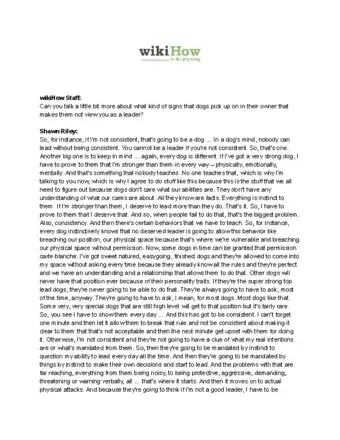
Thanks for reading our article! If you'd like to learn more about buying a dog, check out our in-depth interview with Shawn Riley.
References
- ↑ http://www.humanesociety.org/assets/pdfs/pets/puppy_mills/find_responsible_dog_breeder.pdf
- ↑ http://www.pugvillage.com/your-first-pug/questions-breeder
- ↑ http://www.petpugdog.com/choosing-a-pug-puppy
- ↑ http://www.petpugdog.com/choosing-a-pug-puppy
- ↑ http://www.humanesociety.org/assets/pdfs/pets/puppy_mills/find_responsible_dog_breeder.pdf
- ↑ http://www.pugvillage.com/your-first-pug/questions-breeder
- ↑ http://www.dummies.com/pets/dogs/pugs-for-dummies-cheat-sheet/
- ↑ http://www.humanesociety.org/assets/pdfs/pets/puppy_mills/find_responsible_dog_breeder.pdf
About This Article
To buy a pug puppy, contact local breeders and avoid puppy mills. Speak with a few different breeders and go with one that allows you to visit their facility in person. A good breeder will be able to produce credentials, health certificates, and pedigrees, so don't be afraid to ask. They should also be knowledgeable and eager to go over information with you. Finally, meet the pups and observe them carefully for physical issues and personality characteristics before making your decision. For tips on what questions you should ask the breeder, read on!
